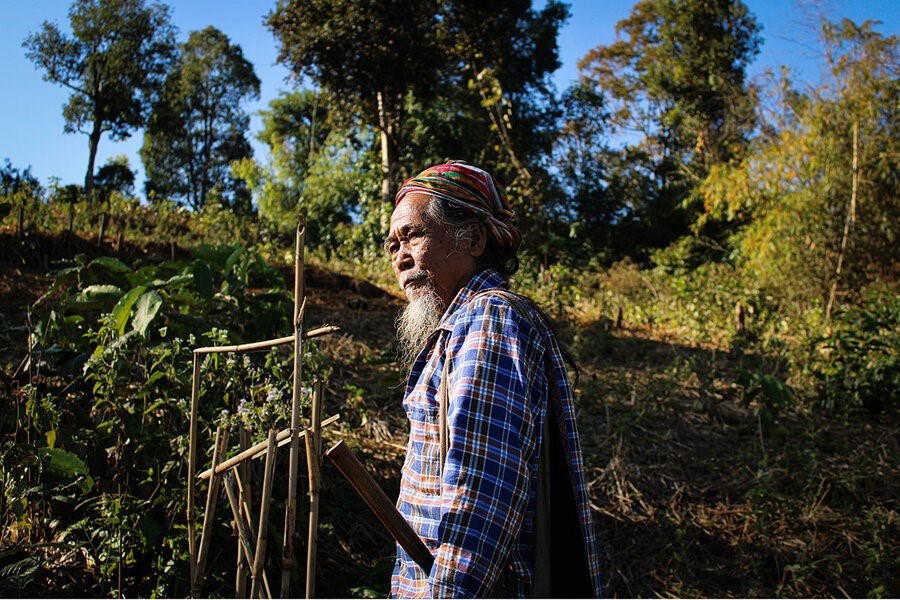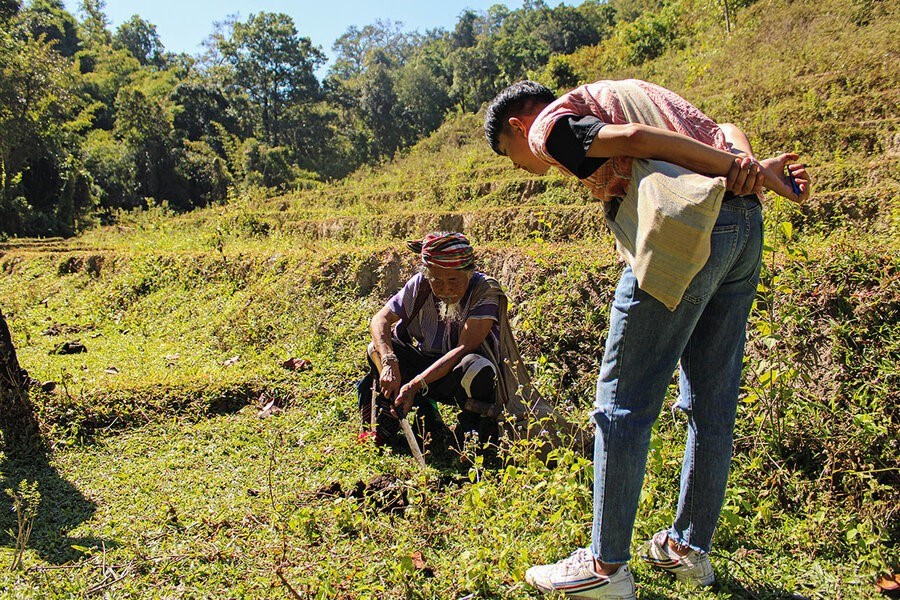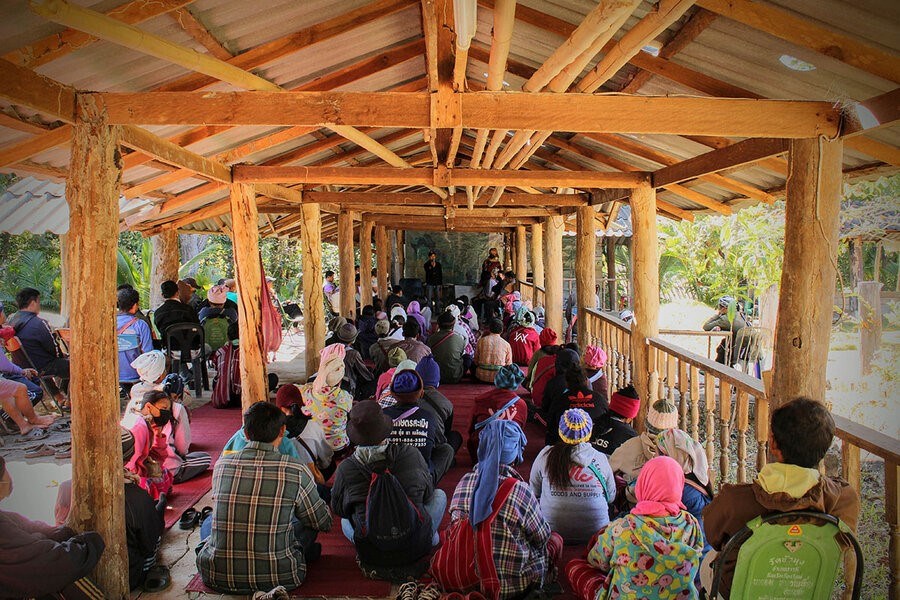REPRINTED WITH PERMISSION FROM THE CHRISTIAN SCIENCE MONITOR
 Tayae Yodchatmingboon, who has lived in his village his whole life, is uncertain whether he will be allowed to continue cultivating his land. Luke Snow
Tayae Yodchatmingboon, who has lived in his village his whole life, is uncertain whether he will be allowed to continue cultivating his land. Luke Snow
June 27, 2023
Bathed in Thailand’s winter sun, a dollhouse-sized structure carved from bamboo sits in a forest clearing. In front of it, an older man bows his head in silent prayer to the spirit of the little house.
For Tayae Yodchatmingboon, the land around this spot is home.
A leader of nearby Ban Sop Lan village, he has lived in the fog-shrouded mountains all his life on land that is part of Ob Khan National Forest, about two and a half hours' drive from the northern city of Chiang Mai. For more than 50 years, Thailand’s Department of National Parks, Wildlife and Plant Conservation has been working on plans to designate this area as a national park, which could mean stricter rules on how the land – and the village – is used.
“If we are not able to farm and to live off the land, our way of life will not be protected,” Mr. Yodchatmingboon says. “The spirit of the community will disappear. Our happiness will disappear.”
The villagers belong to the Karen ethnic group from Thailand and Myanmar, and have lived on this land for many generations. The government wants to expand nearby Ob Khan National Park to ensure the preservation of natural resources and the environment, while the village is fighting to preserve its livelihood and culture. Behind the debate over the park's expansion lies a deeper question about who should be trusted with the land's welfare.
"The government said they have to occupy the land and the current National Park, because if you let the Indigenous people manage their own land, they will destroy the soil or the forest,” says Indigenous rights activist Patchara Kumchumnam, “but in fact the people have lived there for hundreds of years and the national resources are still beautiful."
 Luke SnowA scenic view of the rolling mountains surrounding the village of Ban Sop Lan. The distant hills surround Chiang Mai, Thailand's second-largest city.
Luke SnowA scenic view of the rolling mountains surrounding the village of Ban Sop Lan. The distant hills surround Chiang Mai, Thailand's second-largest city.
A controversial farming practice
Expanding the park’s jurisdiction would force the villagers to reduce their reliance on a traditional farming practice sometimes called rotational farming or slash-and-burn farming.
Rotational farming involves cycling each year among different plots of farmland, leaving five to seven years for old plots to regenerate before they are used again. The practice is often misunderstood by outsiders to mean that farmers are constantly clearing out new forest land for agriculture.
Indigenous farmers like those in Ban Sop Lan village have long used rotational farming practices, and although they do burn the bush and weeds growing on the plot whose turn it is to be cultivated, the ashes are later used as fertilizer, Mr. Yodchatmingboon explains. Villagers and volunteers from neighboring Indigenous communities also make firebreaks each summer to contain forest fires to the designated plot.
Still, critics say the practice contributes to air pollution in Chiang Mai, which is known to have some of the worst air quality in the world during the annual winter burning season. The Department of National Parks declined repeated requests to discuss its plan to expand the park – or what would happen to the villagers if those plans succeed – but the parks department has included slash-and-burn farming practices as evidence of the need for stricter preservation in similar cases.
Environmentalists are indeed concerned that cutting down and burning oxygen-replenishing trees contributes to Chiang Mai’s air quality crisis.
Steve Elliott, a biology professor at Chiang Mai University, has lived in the city for decades and has seen air pollution steadily worsen over the past 15 years as smoke from the region’s annual fires – including in neighboring Myanmar and Laos – gets trapped by the surrounding mountains. And risks aren’t limited to air quality, according to Mr. Elliott.
“We are literally sucking the nutrients out of the soil with the weeds and then burning the weeds and letting those nutrients float away to heaven knows where,” he says. “It's an extremely ecologically unfriendly way to manage soil nutrients.”
 Luke SnowTayae Yodchatmingboon and Patchara Kumchumnam inspect a plot of rotational rice paddy, currently not in use due to seasonal planting.
Luke SnowTayae Yodchatmingboon and Patchara Kumchumnam inspect a plot of rotational rice paddy, currently not in use due to seasonal planting.
Difficult dialogues
Nuthamon Kongcharoen, professor of law at Chiang Mai University, describes “feelings of hardship between the government and the ethnic minorities that live in the conservation area," saying that there needs to be more public dialogue about land management overall. "This [trust debate] is ongoing,” Dr. Kongcharoen adds.
Members of the National Human Rights Commission met villagers and National Park officials in January, after village leaders filed a complaint against the Parks department charging that officials mishandled a 2022 land survey meant to gauge public opinion on the park’s expansion. The commission says it is investigating whether the government violated the villagers’ rights, including by withholding information from the communities ahead of the survey.
At least one member of the commission is sympathetic to the villagers.
“The special thing about the village is that the community network is very strong,” says commissioner Preeda Khongpaen. “They have been here since before the national park and have made use of the forest and rely on it to live.”
Mr. Kumchumnam, an Indigenous rights advocate, says that one sticking point is that park officials struggle to understand why the local Karen community wants so much land when the villagers actively use only a small part of it for farming and homes. Yet many areas of the forest hold spiritual significance.
There’s a children's cemetery, for instance, that very few can enter, and certain trees that are considered connected to human spirits and cannot be cut down. Under the parks department’s governance, villagers worry they would lose the comfort and privacy of these spaces, as well as the freedom to manage spiritual sites as they see fit.
Indigenous approach
Another challenge, according to Mr. Kumchumnam, is that the government refuses to acknowledge the existence of Indigenous people in Thailand, in order to sidestep the United Nations Declaration on the Rights of Indigenous People, which the Thai government has signed. Indeed, no current legislation uses the term “Indigenous,” often referring to these communities as “ethnic groups.”
 Luke SnowVillage members gather to discuss the future of their land and hear community leaders present their plans to officials seeking to limit their land use in an extended national park.
Luke SnowVillage members gather to discuss the future of their land and hear community leaders present their plans to officials seeking to limit their land use in an extended national park.
Like many Indigenous communities worldwide, the Ban Sop Lan villagers believe this land cannot be owned, and instead seek to care for and protect the forest in return for using it. Many residents are also worried about opportunities for the village’s young people, who often move to cities to find work. Banning their agricultural traditions could further limit economic opportunity in the village, community leaders say.
Wuarni Galan, Mr. Yodchatmingboon’s granddaughter, the first in the village to attend university, has returned to teach English, and now lives with her mother and three siblings. When she visits friends in Chiang Mai, she is reminded how necessary it is to preserve this forest.
“The land is very important to both our community and the city,” she says. “I was born here and have lived here, and I’d be sad without the land.”
This story was produced with support from the Round Earth Media program of the International Women’s Media Foundation. Anna Lawattanatrakul contributed reporting.
Related stories
Page created on 6/28/2023 2:17:09 PM
Last edited 6/28/2023 3:00:38 PM
